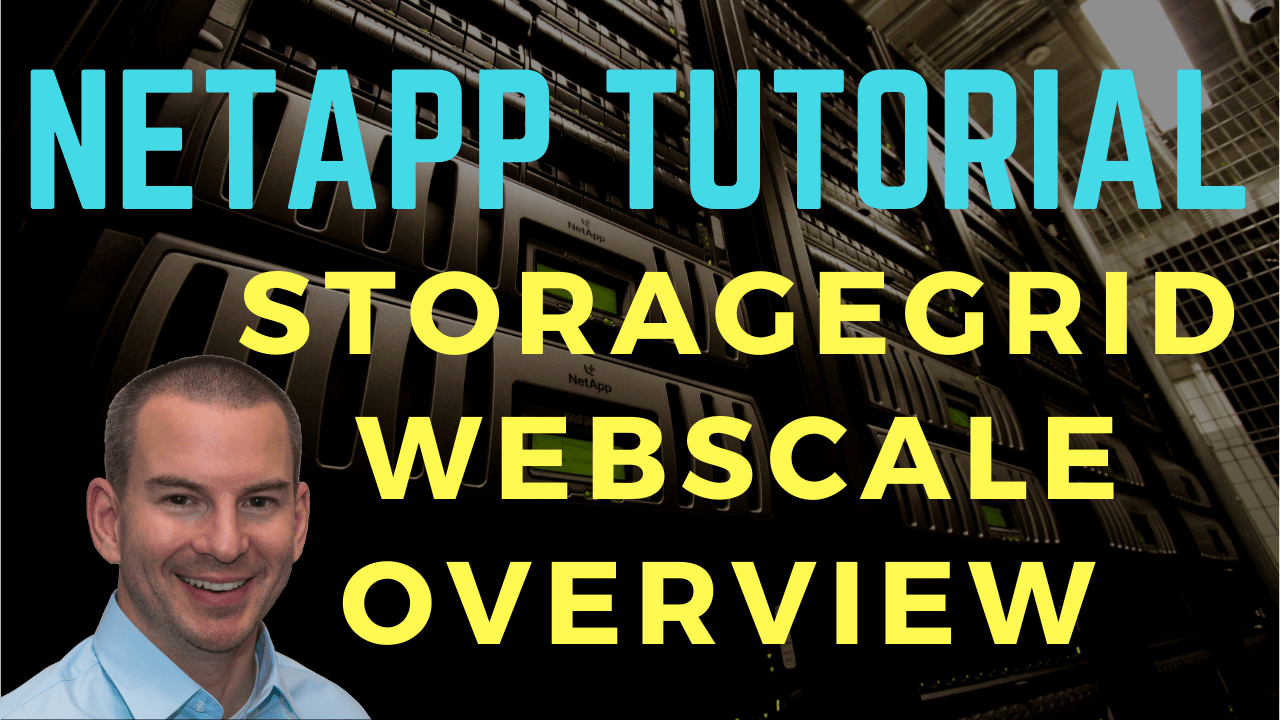
In this NetApp training tutorial, I’ll give you an overview of StorageGRID Webscale which is NetApp’s object storage platform. Scroll down for video and also text tutorial.
NetApp StorageGRID WebScale Overview Video Tutorial

Niklas Kusserow

First of all I want to thank you for the unbelievable work! The new NetApp course is even more informative, structured, exciting and detailed than the last one. I could not believe that this was possible but it is!
The way you are teaching the theory is understandable to everyone. No matter if they work with Netapp for years or just started learning it.
The labs are easy to build but super powerful, they represent every single detail from the theory lessons and help understand the material even more!
I would spend much more to get this oodles of knowledge from a teacher like you. Please keep up your great work!
StorageGRID Webscale provides on premises object storage. You're probably already familiar with object storage from the public cloud providers like S3 from Amazon.

StorageGRID Webscale gives you the object storage capability on premises in your own private cloud. It can also integrate with the public cloud providers such as S3, so you can store your objects either on premises or you can move them over to S3. It also allows you to run those public cloud services on your object.
When you are using it both in private and in the public cloud, that would be known as a hybrid solution. It supports up to 120 petabytes of storage with up to 100 billion objects and up to 16 data centers on premises. It's a massively scalable solution as you would expect with object storage.

The nodes are installed as an E-Series based hardware appliance or in software as a VMware, virtual machine, or a Docker container running on Linux. Client access to the object store is through Amazon S3 or OpenStack Swift APIs.
You can also access it through NAS protocols via the NAS Bridge. The NAS Bridge is a virtual machine that goes as part of your storage grade cluster and it converts the data object storage format.
Information Lifecycle Management (ILM) is a software feature that comes with StorageGRID which provides granular control of how many copies of objects are stored and where they are stored. Versioning, WORM, deduplication and compression, and at-rest and in-flight encryption are supported. StorageGRID evolved from the acquisition of Bycast way back in 2010.

StorageGID Webscale Use Cases
StorageGRID gives you object storage capability on premises in your own private cloud. The use cases are the same use cases that you would have for object storage in the public cloud, the difference is that it brings it on premises so it gives you more control and cost savings as well.
These use cases as we would have in the public cloud are media files, medical, oil and gas, internet of things, and backup applications.

This is what the StorageGRID hardware appliance looks like. On NetApp.com, click on products, and under the data storage systems, you can see the StorageGRID object storage.

You can also see the different models that are currently available. The different models have got different amounts of CPU cores and support different amounts of capacity. As usual, you can have different nodes making up the same cluster or grid as it's known with StorageGRID.
Additional Resources
Introduction to the StorageGRID Webscale System: https://library.netapp.com/ecmdocs/ECMLP2412002/html/GUID-731833F5-D19B-4429-8612-84E4D62787C2.html
Now You Can Tier to Even More Clouds with StorageGRID: https://www.netapp.com/blog/now-you-can-tier-to-even-more-clouds-with-storagegrid/
Click Here to get my 'NetApp ONTAP 9 Storage Complete' training course.
Libby Teofilo

Text by Libby Teofilo, Technical Writer at www.flackbox.com
Libby’s passion for technology drives her to constantly learn and share her insights. When she’s not immersed in the tech world, she’s either lost in a good book with a cup of coffee or out exploring on her next adventure. Always curious, always inspired.